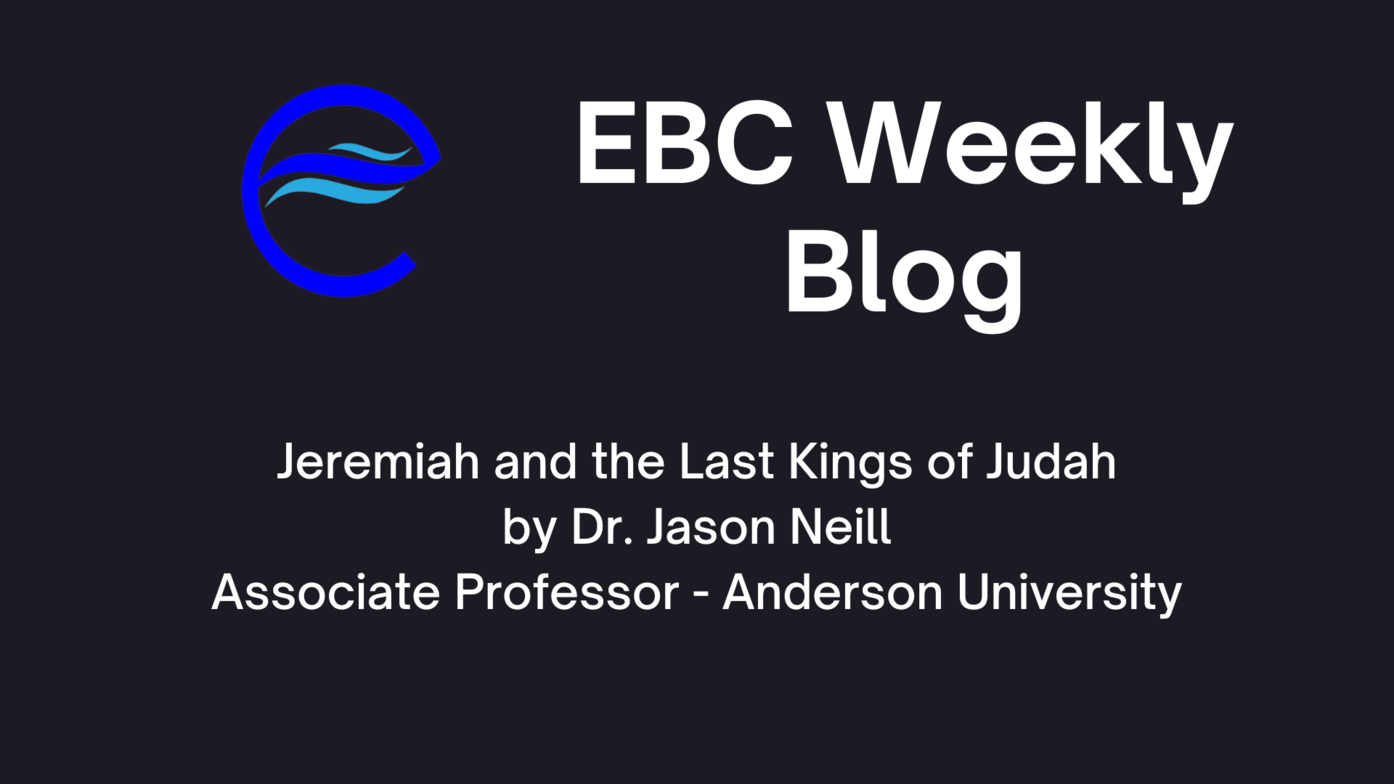Jeremiah and the Last Kings of Judah


August 4, 2025
Jeremiah and the Last Kings of Judah
by Jason Neill
Scripture reading: Jeremiah 1 & 31
It was a spiritually dark time in Judah. Josiah, the last good king of Judah, had died and with his death came the cessation of his godly influence. You see, he was responsible for renovating the temple, the place where the Ark of the Covenant resided (see Exodus 25:10-22; 1 Kings 8:1-11) and where God’s presence dwelled. In the process of remodeling, the law of God was discovered; apparently, it was lost (see 2 Kings 22:8-20). The misplacement of the law of God indicated the value, or lack thereof, the nation placed upon God’s word. Consequently, “…the king summoned all the elders of Judah and Jerusalem. And the king went up to the Temple of the LORD with all the people of Judah and Jerusalem, along with priests and the prophets – all the people from the least to the greatest. There the king read to them the entire Book of the Covenant that had been found in the LORD’s Temple” (2 Kings 23:1-2, NLT).
Josiah instructed the high priest to remove all the articles that previously occupied the Temple which was used to worship idols. All those carved images of other gods were burned outside the city. He also had the numerous altars, used in pagan idol worship, destroyed. These altars were traditionally built on “high places,” specifically thought to enable the worshiper to draw closer to their false deity, yet violated the Mosaic Covenant (see Deuteronomy 12:2-3; 1 Kings 14:23-24; 2 Kings 16:4; 17:9-10). Child sacrifices were also common on these altars.
Sadly, the reforms ended when King Josiah was killed during battle by Pharaoh Neco, King of Egypt (see 2 Kings 23:29-30). The nation, again, deteriorated spiritually. It was during the days of King Josiah that Jeremiah, the prophet, began his ministry. To prove the nation’s spiritual decline, the author of 2 Kings repeats a phrase to indicate that the kings that followed were spiritually bankrupt. It was said of Kings Jehoahaz, Jehoiakim, Jehoachin, and Zedekiah they “did what was evil in the sight of the LORD” (see 2 Kings 23:32; 23:37; 24:9; 24:19). This phrase was used to show that these kings had left the true worship of God and reverted to idol worship.
A breakdown of the book of Jeremiah can be seen as follows:
- Chapters 1-29 revolve around Jeremiah’s message of judgment to the nation
- Chapters 30-33 offer hope amid judgment
- Chapters 34-52 record his experiences before, during, and after the invasion of Babylon.
Authorship and Date: The book is attributed to Jeremiah as the author (see Jeremiah 1:1). Other biblical authors such as Daniel (see Daniel 9:2 compared to Jeremiah 25:11-14 & 29:10), Matthew (see Matthew 2:17-18 compared to Jeremiah 31:15; 21:13 compared to Jeremiah 7:11), Mark (see Mark 11:17 compared to Jeremiah 7:11), Luke (see Luke 19:4 compared to Jeremiah 7:11), Paul (see Romans 11:27 compared to Jeremiah 31:33), and the author of Hebrews (see 8:8-13 compared to Jeremiah 31:31-34) also attribute the writing to Jeremiah.
His ministry addressed Judah and Jerusalem and spanned the reign of five kings starting in 627 to 580 B.C. Those kings included:
- Josiah (640-608 B.C.; see 2 Kings 22-23;2 Chronicles 34-35; Jeremiah 1:2)
- Jehoahaz (608 B.C. – ruled for 3 months; see 2 Kings 23:31-34; 2 Chronicles 36:1-4; Jeremiah 22:10-12)
- Jehoiakim (608-597 B.C.; see 2 Kings 23:34-24:7; 2 Chronicles 36:5-8; Jeremiah 36)
- Jehoachin (597 B.C. – ruled for 3 months; see 2 Kings 24:8-16; 2 Chronciles 36:9-10; Jeremiah 22:24-30)
- Zedekiah (597-586 B.C.; see 2 Kings 24:17-25:7; 2 Chronicles 36:11-21; Jeremiah 21; 32; 34; 37-39; 52).
To fully appreciate the context of his ministry, read 2 Kings 21-25.
Jesus in Jeremiah & Its Application: Jeremiah 31:31-34 reads, “Behold, the days are coming, declares the LORD, when I will make a New Covenant with the house of Israel and the house of Judah, not like the covenant that I made with their fathers on the day when I took them by the hand to bring them out of the land of Egypt, my covenant that they broke, though I was their husband, declares the LORD. For this is the covenant that I will make with the house of Israel after those days, declares the LORD: I will put my law within them, and I will write it on their hearts. And I will be their God, and they shall be my people. And no longer shall each one teach his neighbor and each his brother, saying, ‘Know the LORD,’ for they shall all know me, from the least of them to the greatest, declares the LORD. For I will forgive their iniquity, and I will remember their sin no more” (ESV).
Jesus spoke of this New Covenant during the Last Supper (see Matthew 26:27-28; Mark 14:23-24; Luke 22:20). His death on the cross inaugurated this covenant (see 1 Corinthians 11:25; Hebrews 9:15-17; 10:1-18). Because God is just and holy, He could not overlook sin; it must be punished. He poured out the punishment for our sins on Christ; he willingly served as our substitute (see Romans 5:8; 1 John 2:2). The cross was God’s greatest demonstration of love for you and me. He loves us so much that he removed the barrier of our sins and died in our place (see Romans 5:8). He promises to give eternal life to anyone willing to believe in Jesus for that gift (see John 3:16; 5:24; 6:47). This eternal life can never be lost, and it makes you one of his children forever (see John 1:12). Is there anything keeping you from believing in Jesus for eternal life right now?